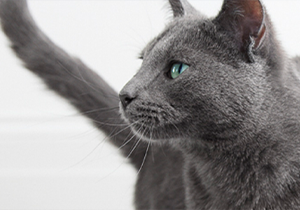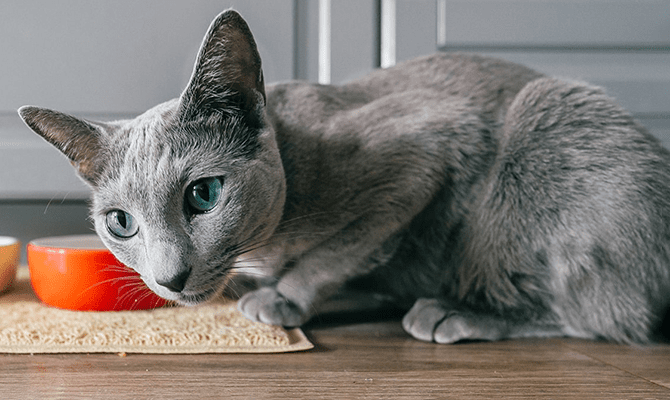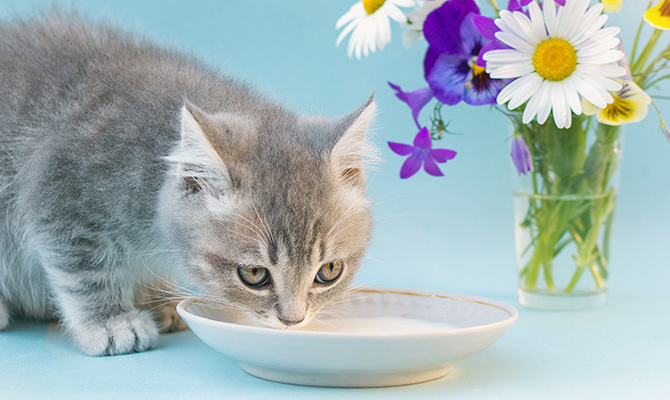Kitten Feeding Guide For Proper Nutrition
Now that you are a cat parent, how amazing does it feel? While it is a pleasure to watch the little felines and their mysterious ways of life, it is crucial to take care of their health. Since our furry friends are great foodies and often run the risk of obesity, it is up to you to make sure that your kitten receives just the right amount of balanced diet throughout the day. Usually, a kitten's diet consists of both wet and dry food in the right proportions. Furthermore, young cats should be fed the right quantity at the right time intervals.
If you are a new parent, we understand that you might have some trouble understanding the night diet plan, but there is no need to worry, we have you covered. This article is a kitten feeding guide and also aims to address questions like what to feed kittens.
How often do kittens eat?
You should ideally feed your kitten both wet and dry cat food. Wet cat food is vital to a kitten’s diet as it helps in keeping your little ball of joy hydrated. However, wet food sticks to their teeth very frequently and can cause dental issues. So, if your kitten is on a wet food diet, make sure to clean its teeth frequently. One way of ensuring your kitten receives all the vital nutrients while they feast on delicious meals is by getting Sheba Premium Cat Food for them. Made with the goodness of high-quality ingredients, Sheba Premium Cat Food is the ideal choice for the royalty that your kitten is.
Dry cat food, on the other hand, is an easier option to go for. But as a parent, you need to keep a check on the amount your feline friend is consuming, because overeating dry cat food can lead to several health conditions like blood pressure, respiratory issues, etc.
The ideal frequency for a kitten to eat is 6 times a day, every 4-5 hours. Depending on their age, their diet must be regulated, so it is important to get in touch with a veterinarian who can suggest an ideal kitten feeding guide and the number of daily calories that the kitten needs to intake and plan the diet chart accordingly. Once a feeding schedule has been prepared, you can easily make sure that your furry friend receives all essential nutrients in the right amounts so that they can stay healthy and active.
Overfeeding A Kitten
Overfeeding the kitten regularly can cause various health issues, including heart and renal diseases. So, it is advised to avoid overfeeding as much as possible. Obesity, as mentioned earlier, is quite common and extremely dangerous for cats. Regular overfeeding can lead to obesity and result in difficulty in mobility, increased lethargy and enhanced risks of contracting liver and heart diseases. Long-term consequences of overfeeding often involve the kitten getting diabetic too.
To avoid overfeeding, ensure to only feed the number of calories advised by the veterinarian. You can also start by charting out the feed for 24 hours at the beginning of the day and making sure that the kitten consumes just the prescribed amount of cat food. Kittens also tend to hurriedly gulp down a large amount of their food which might lead to respiratory problems, or make the kitten throw up. So, you can introduce your kitten with small servings which they can consume without overfeeding. Staying physically active can also help them burn extra calories and stay in shape.
How much to feed a kitten
Wondering what to feed kittens? Kittens in their rapidly growing phase need to eat a lot of food compared to adult cats. Young kittens often eat ¼ to ½ cups of food at a time. But allowing them to eat as much as they wish can develop unhealthy eating habits. The feeding pattern for kittens is not constant, however, and can change depending on the breed of the kitten as well as their age. Veterinarians generally calculate the ideal calories for your kitten using metabolic formulas. In addition to following the diet chart prescribed by your veterinarian, here is also a kitten feeding guide for you to get started.
| Age of the Kitten | 0-1 week | 1-2 weeks | 2-3 weeks | 3-4 weeks | 4-5 weeks | 5-6 weeks |
| What to feed | Kitten formula | Kitten formula | Kitten formula | Kitten formula | Kitten formula mixed with wet food | Wet or dry food |
| Amount to feed | 2-6 ml | 6-10 ml | 10-14 ml | 14-18 ml | 18-22 ml | As recommended by the veterinarian |
| How often do you need to feed | Bottle feed every 2 hours | Bottle feed every 2-3 hours | Bottle feed every 3-4 hours | Bottle feed every 4-5 hours | Feed every 5-6 hours | Feed every 5-6 hours |
Kitten Feeding Method
There are two kinds of kitten feeding methods, as mentioned below:
-
Free-Feeding Method
Some cat parents leave out the food in a bowl, allowing their cats or kittens to eat as much as they like. Free feeding using dry cat food is convenient for cat parents, especially if they are out of the home all day. The method is good in a way because this ensures the cat can eat any time it is hungry and will never starve. However, while free feeding can be helpful, it is preferred for adult cats. In the case of kittens, this method has an obvious disadvantage of the kitten gaining excessive weight which can lead to multiple health problems.
Unless checked, free feeding can also prove to be unhealthy for older cats since they show more domination to access the food if they have a habit of free feeding. Using a microchip-activated feeder can be helpful since that only opens and delivers food when it scans your kitten’s microchip.
-
Meal Feeding Method
If you prefer to feed your kitten wet food over dry food, meal feeding should be your only option. The reason is obvious. Wet food cannot be left out for the cat to eat according to its wish all day because it will spoil. Meal feeding, thus, needs the active involvement of the parent as the parent has to feed the specific portions during meal times to the kitten. There are many advantages of meal feeding. Not only does meal feeding help kittens receive their required nutrients on time, but it also helps avoid the risk of obesity as well. And since meal feeding mostly accounts for wet food, it allows the kitten to stay hydrated.
If you are worried about forgetting to feed your kitten, the best way to meal-feed is to have a routine schedule. As a parent, you can use food bowls which work on a timer.
When to stop feeding kitten food
You must keep in mind that your adorably small kitten will not remain a baby forever, but will rather will grow into a majestic adult cat in no time. And as your kitten grows, it is normal to wonder what to feed kitten.
Through the course of their life, cats undergo dietary requirement changes depending on their age, breed, and activity. New born kittens usually receive their nutrition from formula-based diets, which obviously cannot give an adult cat the adequate amount of nutrition it requires. So, it is important to switch to adult cat food at the right time to ensure your cat keeps receiving the nutrition they require to stay healthy.
Kittens grow fast and within 30 weeks from their birth, they achieve almost 80% of their adult size. So, gradually shifting to food meant for adult cats by the time your little furball is one year old can be a wise idea. However, instead of suddenly switching to adult food, it is advisable to get your cat acclimated to the adult food gradually by supplementing the kitten formula with trace amounts of adult cat food. You can slowly increase the amount of adult cat food mixed with kitten formula till your cat completely transitions to eating adult food. Usually, a cat can completely shift to adult cat food by the time they are 18 months of age. So, if you are also wondering how much to feed a kitten 3 months, this is the time you can start. You can also get in touch with your veterinarian to find out what to feed kittens.
Conclusion
If you are planning to introduce your feline furball to quality wet food and wondering how much to feed a kitten, Sheba has the best option for you. Sheba’s Premium Wet Cat Food does not just provide all vital nutrients to your furry friend but also makes sure that they receive the food in the right portions. Sheba’s Premium Cat Food is the perfect treat to add a regal touch to your kitten's palate because they simply deserve the best! Sheba's Premium Wet Cat Food is so delicious that your royal kittiness will be delighted with every bite. And you can have peace of mind knowing your kitten is receiving balanced nutrition.
FAQs
-
What is a good eating schedule for a kitten?
As a new cat parent, it is normal to worry about small things like how much should a kitten eat. Newborn kittens should be fed every 1-2 hours. Since they have a small tummy, they cannot hold much food at a time. As the small kitten grows up, a good eating schedule would be 6 meals a day.
-
Should kittens eat wet or dry food?
Another common question faced by new cat parents is how much to feed a kitten. Very small kittens of 1-3 weeks should have canned food as a part of their diet because their teeth are not well developed to have dry food. As they grow older you can give both wet and dry food.
-
Should I leave food out for my kitten at night?
For baby kittens, leaving food out at night can be a wise idea as they are at their growing age and need sufficient nutrition and calories but ensure the amount is not too much. It's better to consult a veterinarian about the amount of food you can keep at night for your bundle of joy to eat freely.
-
How do I know if my kitten is hungry?
Cats are wonderful foodies who love to eat. But eating too much will not just make them obese, but also lead to several health issues, so you need to look out carefully for signs if your kitten is hungry. One of them would be if they are eating too fast. If your kitten is crying at mealtime, it could also indicate that they are hungry.
-
At what age can kittens eat dry food?
Kittens of 5-6 weeks of age can be given trace amounts of dry food alongside their usual kitten formula. However, it is vital to note that, unlike wet food, dry food does not contain moisture, so if you are feeding your kitten dry food, make sure that they are drinking sufficient water to avoid dehydration.








